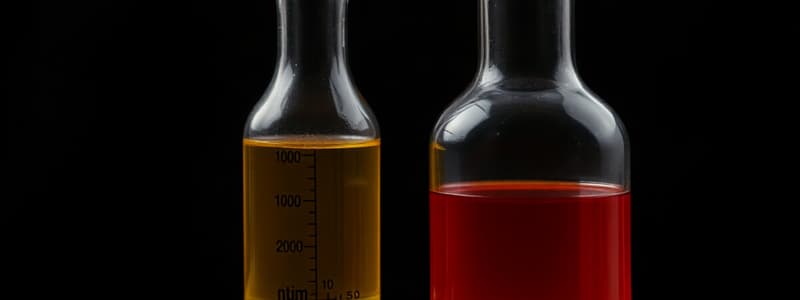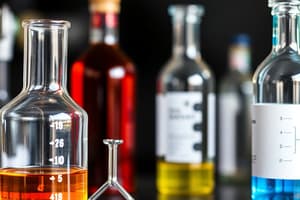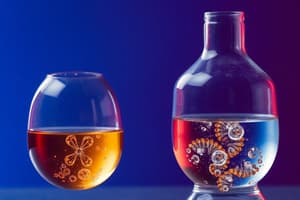Podcast
Questions and Answers
Associez les types de réactions aux descriptions appropriées :
Associez les types de réactions aux descriptions appropriées :
Oxydation = Formation d'aldéhydes à partir d'alcool primaire Déshydratation = Formation d'alcènes par élimination d'une molécule d'eau Estérification = Réaction entre un alcool et un acide carboxylique Halogénation = Remplacement du groupe hydroxyle par un atome d'halogène
Associez les types d'alcools aux produits de leur oxydation :
Associez les types d'alcools aux produits de leur oxydation :
Alcool primaire = Aldéhyde ou acide carboxylique Alcool secondaire = Cétones Alcool tertiaire = Résistant à l'oxydation Aldéhyde = Oxydé en acide carboxylique
Associez les agents oxydants avec leurs formules chimiques :
Associez les agents oxydants avec leurs formules chimiques :
Permanganate de potassium = KMnO4 Dichromate de potassium = K2Cr2O7 Acide chromique = H2CrO4 Sulfate de cuivre = CuSO4
Associez les acides utilisés dans les réactions de déshydratation :
Associez les acides utilisés dans les réactions de déshydratation :
Associez les règles avec leur application :
Associez les règles avec leur application :
Associez les types de réactions avec les changements chimiques :
Associez les types de réactions avec les changements chimiques :
Associez les groupes fonctionnels aux types de substances :
Associez les groupes fonctionnels aux types de substances :
Associez les structures d'alcools aux effets sur la réactivité :
Associez les structures d'alcools aux effets sur la réactivité :
Associez les réactifs à leurs produits attendus :
Associez les réactifs à leurs produits attendus :
Associez les phénomènes avec leurs conditions :
Associez les phénomènes avec leurs conditions :
Flashcards
Oxydation des alcools
Oxydation des alcools
Les réactions d'oxydation des alcools impliquent la perte d'atomes d'hydrogène (et parfois l'ajout d'oxygène), menant à la formation de composés carbonylés, comme les aldéhydes, les cétones ou les acides carboxyliques.
Oxydation d'alcools primaires, secondaires et tertiaires
Oxydation d'alcools primaires, secondaires et tertiaires
Les alcools primaires peuvent être oxydés en aldéhydes et ensuite en acides carboxyliques, tandis que les alcools secondaires sont oxydés en cétones. Les alcools tertiaires sont généralement résistants à l'oxydation.
Déshydratation des alcools
Déshydratation des alcools
La réaction de déshydratation implique la perte d'une molécule d'eau (H2O) d'un alcool, formant une double liaison carbone-carbone pour créer un alcène. Cette réaction est généralement catalysée par un acide fort comme H2SO4.
Règle de Zaitsev
Règle de Zaitsev
Signup and view all the flashcards
Estérification
Estérification
Signup and view all the flashcards
Halogénation des alcools
Halogénation des alcools
Signup and view all the flashcards
Influence de la structure de l'alcool sur la réactivité
Influence de la structure de l'alcool sur la réactivité
Signup and view all the flashcards
Effet des groupes fonctionnels supplémentaires
Effet des groupes fonctionnels supplémentaires
Signup and view all the flashcards
Solubilité des alcools
Solubilité des alcools
Signup and view all the flashcards
Applications des alcools
Applications des alcools
Signup and view all the flashcards
Study Notes
Types of Reactions Involving Alcohols
- Alcohols participate in various chemical reactions, influenced by the functional group and reaction conditions. These reactions often involve bond rearrangements around the hydroxyl (-OH) group.
- Common reaction types include oxidation, dehydration, esterification, and halogenation.
Oxidation Reactions
- Alcohols can be oxidized to aldehydes, ketones, carboxylic acids, or further oxidized products, depending on their type and the oxidizing agent.
- Primary alcohols can be oxidized to aldehydes, further oxidized to carboxylic acids.
- Secondary alcohols are oxidized to ketones.
- Tertiary alcohols are generally resistant to oxidation under mild conditions.
- Common oxidizing agents include potassium permanganate (KMnO4), potassium dichromate (K2Cr2O7), and chromic acid (H2CrO4).
- The specific product depends on reaction conditions and the oxidizing agent.
Dehydration Reactions
- Alcohols lose a water molecule (H2O) to form alkenes during dehydration reactions.
- This reaction is often catalyzed by strong acids, such as sulfuric acid (H2SO4) or phosphoric acid (H3PO4).
- Reaction conditions (temperature, acid concentration) affect selectivity.
- The primary product is typically the alkene with the most substituted double bond, following Zaitsev's rule.
Esterification Reactions
- Alcohols react with carboxylic acids in the presence of a strong acid catalyst to form esters.
- This reaction is known as Fischer esterification.
- The reaction involves condensing alcohol and carboxylic acid functional groups, eliminating a water molecule.
- The ester formed depends on the alcohol and carboxylic acid used.
Halogenation Reactions
- Alcohols undergo halogenation where a halogen atom (e.g., chlorine, bromine) replaces the hydroxyl group.
- This reaction is often carried out with halogenating agents such as thionyl chloride (SOCl2) or phosphorus tribromide (PBr3).
- Reaction conditions influence the reaction rate and selectivity.
Other Important Reactions and Factors
- Alcohol structure (primary, secondary, tertiary) significantly affects reactivity in various reactions.
- The presence of other functional groups in the molecule influences reaction pathways and products.
- Reaction conditions (temperature, pressure, solvent, catalyst) dictate yield and selectivity.
- Some reactions involve intermediate steps and mechanisms. For example, oxidation mechanisms often involve carbocation intermediates.
Studying That Suits You
Use AI to generate personalized quizzes and flashcards to suit your learning preferences.



